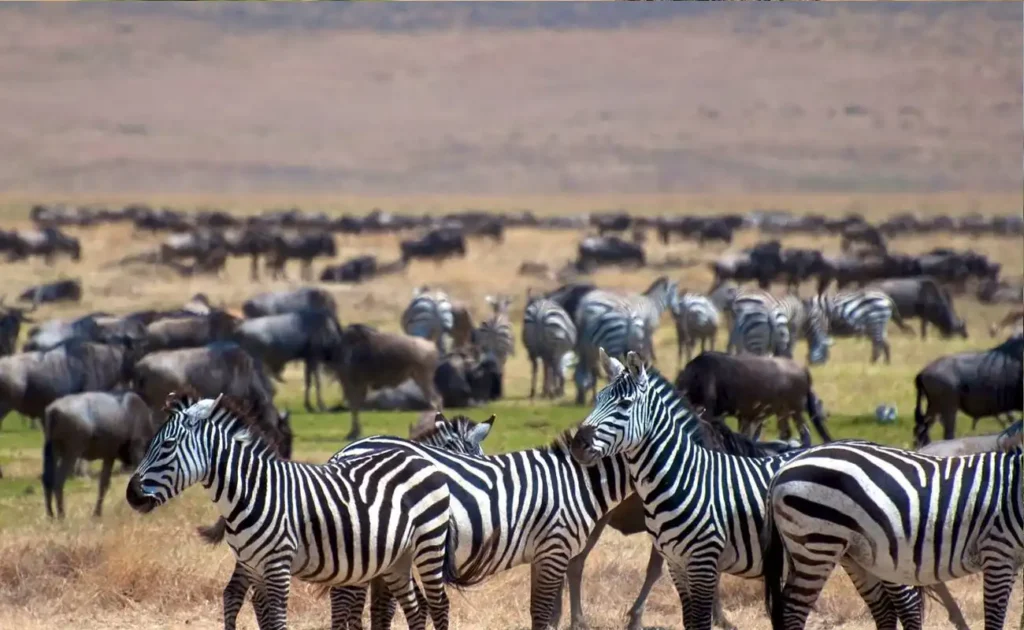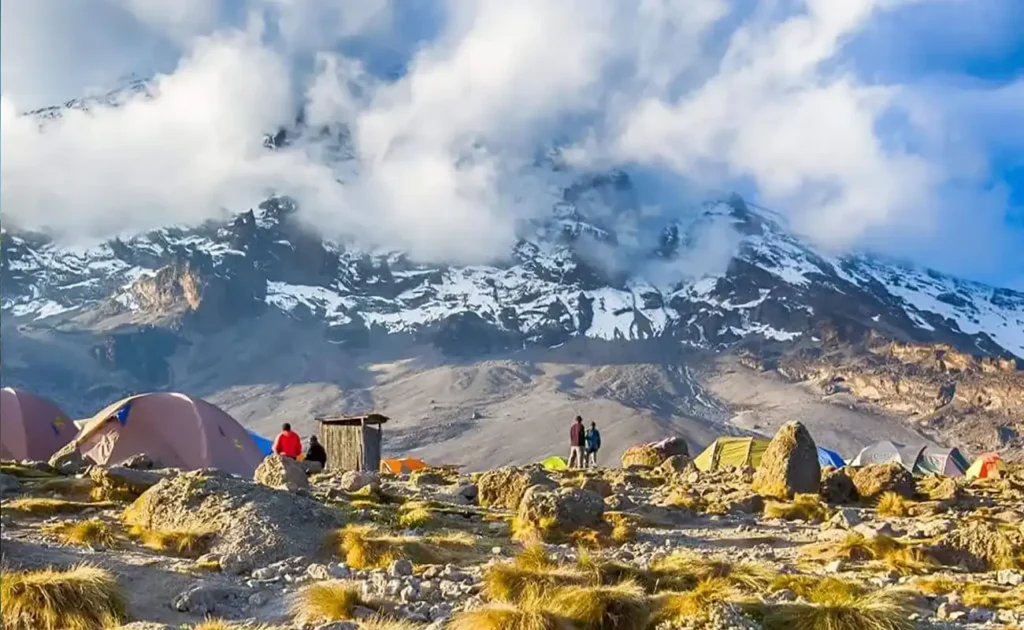Each year, thousands of visitors are captivated by the aromatic allure of Zanzibar, an island renowned for its rich history intertwined with spices and wildlife. Have you ever considered the unique combination of exploring the lush spice plantations and then venturing into the wild on an equatorial safari? This combination offers an immersive glimpse into the vibrant culture and ecological diversity of the region.
Since the 16th century, Zanzibar has been at the heart of the global spice trade, earning the moniker “Spice Island.” This attracts experts seeking insights into the sustainable practices of spice farming. Meanwhile, safaris in the northern regions of Tanzania, known for hosting over 400 different species, provide unparalleled opportunities for bird watching and wildlife photography, making it a destination for nature enthusiasts worldwide.

Zanzibar Spice Tour: A deep dive into the island’s aromatic history
In the heart of the Indian Ocean lies Zanzibar, often called the “Spice Island” due to its rich history in spice production. The island’s fertile soil and tropical climate make it perfect for growing a variety of spices like cloves, nutmeg, and cinnamon. Spices not only contributed to the local economy but also played a key role in global trade, showcasing the island’s importance in the spice market. Many visitors today explore the spice plantations to understand how these spices are cultivated and harvested. This unique experience provides a fragrant insight into Zanzibar’s agricultural traditions.
The history of Zanzibar’s spice trade dates back to the 15th century when traders from the Middle East began sourcing spices from the island. Over the centuries, the spice trade expanded, with European powers eager to gain control of this valuable resource. Spices became a staple in cuisines around the world, and the island grew in prominence. The vibrant history behind each spice is shared by knowledgeable guides on the tours. These guides bring stories of old trade routes and cultural exchanges that shaped Zanzibar.
Today, spice tours are a major attraction, allowing tourists to immerse themselves in the tropical ambiance. Guests can wander through green plantations and see, touch, and smell various spices. Participating in these tours not only entertains but educates about sustainable farming practices. According to this article, Zanzibar hosts a large food tourism event annually, highlighting its deep connection to culinary culture. Such events emphasize the importance of spices in local and global cuisines.
Exploring Zanzibar’s spice routes is an adventure that blends history, culture, and nature. Tourists learn how pivotal the island has been in connecting different parts of the world through spices. Modern-day visitors can appreciate this legacy while enjoying their flavorful discoveries. Additionally, there’s an emerging trend to combine spice tours with safaris, offering a full Tanzanian experience as described in this post. This combination showcases Tanzania’s diverse offerings, with Zanzibar as a highlighted stop.
Exploring the origins and significance of Zanzibar’s spice trade
The spice trade in Zanzibar has its roots deeply planted in the ancient world, with influences stretching across continents. Traders from Persia and Arabia were among the first to discover the island’s potential for spice cultivation. The strategic location of Zanzibar made it a convenient stopover for merchants traveling between Asia, Africa, and Europe. Over time, this thriving trade turned Zanzibar into a melting pot of cultures and traditions. These exchanges enriched the local way of life, leaving a lasting impact.
Spices like cloves, cinnamon, and black pepper became essential commodities in international trade networks. The demand for these aromatic wonders grew as they were used not only for flavoring but also for medicine and preservation. The high value of spices attracted European colonial powers, eager to control production and trade. This led to a tug-of-war over control, shaping the historical landscape of the region. Consequently, Zanzibar rose to prominence, leaving a legacy that lasts even today.
Walking through a spice plantation today offers a glimpse into this rich history. Visitors can observe the intricate processes involved in growing and harvesting spices, from planting seeds to drying and packaging. The hands-on experience provides unforgettable insights into Zanzibar’s vibrant agricultural heritage. Local guides share fascinating tales of the past, making every visit educational and engaging. These stories are key to understanding Zanzibar’s historical significance.
Listed below are the major spices that have put Zanzibar on the map:
- Cloves
- Cinnamon
- Nutmeg
- Black Pepper
These spices, alongside others, laid the foundation for the economic prosperity the island experienced. Their value lies not only in monetary terms but also in how they weave the cultural tapestry that defines Zanzibar today.
Embarking on a Spice Tour: What to expect?
Setting off on a spice tour in Zanzibar is an adventure through lush landscapes and vibrant aromas. As you walk through the thriving plantations, prepare to be enveloped in the scents of cinnamon, cloves, and nutmeg. Guides will lead you along paths lined with towering spice trees, sharing interesting facts about each plant. You’ll learn how spices are cultivated, from preparing the soil to the careful picking of harvests. This journey offers an engaging blend of education and sensory experiences.
Throughout the tour, you will have the chance to taste fresh spices right off the plant. Imagine biting into a raw clove bud to experience its intense, numbing flavor. Also, you might get to see traditional methods used to process spices. These hands-on activities bring you closer to the island’s rich botanical culture. Each visit promises a unique and memorable exploration.
Your guides, often with generations of knowledge, narrate captivating stories about Zanzibar’s spice history. They explain how spices have shaped local customs and cuisine over centuries. This storytelling enriches the tour, offering insights into how this tiny island became a global spice hub. Visitors typically leave with a newfound respect for the hard work that goes into every pinch of spice. The tales you hear are as enriching as the spices you savor.
Before your tour concludes, make sure to drop by the local markets. Here you can purchase an array of spices to take home. These vibrant markets showcase a bounty of colors and scents, offering a perfect ending to your spice journey. Pack some Zanzibar spices, and you’ll have a flavorful reminder of your adventure. Experience the island’s vibrant culture with every whiff and taste back home.
Zanzibar Safari: A thrilling journey into the wild
Zanzibar isn’t just about spices and beaches; it also offers exciting safaris that reveal the island’s wild side. A safari here introduces travelers to diverse ecosystems, including forests and mangroves filled with unique wildlife. As you embark on this journey, expect to encounter vibrant birdlife, making it a paradise for bird enthusiasts. Keep an eye out for rare red colobus monkeys, a species found only on this island. This adventure promises an exciting, eye-opening experience.
The Jozani Forest is a popular destination for those looking to explore wildlife up close. Walking through its dense foliage, you’ll hear the rustle of the wind and songs of exotic birds. Knowledgeable rangers guide visitors, sharing intriguing details about the forest’s flora and fauna. They explain how the unique environment supports various species, contributing to the region’s rich biodiversity. Each step in this forest feels like a step into a living encyclopedia of nature.
No safari is complete without exploring the coastal and marine parks of Zanzibar. These areas protect stunning coral reefs and support an array of marine life. Snorkeling and diving offer glimpses into underwater ecosystems bustling with colorful fish and sea turtles. The beauty beneath the waves is as thrilling as the wildlife on land. These experiences expand visitors’ appreciation of Zanzibar’s natural treasures.
Here are some must-see spots on a Zanzibar safari:
- Jozani Forest Reserve
- Mnemba Atoll Marine Park
- Ngezi Forest
- The Mangrove Swamps
Each location adds a distinct element to the safari, ensuring an adventure filled with discoveries. Exploring these places offers deeper insights into conservation efforts and the need to protect these vital ecosystems.
Zanzibar safaris blend exploration with education, making them perfect for families and wildlife enthusiasts. The island’s diverse habitats ensure that every safari is unique, with thrilling encounters and moments of wonder. After a day of exploring, travelers often come away with a fresh perspective on nature. They leave inspired by the sights and sounds of the wild. A journey through Zanzibar’s wilderness highlights the island’s ecological richness and adventurous spirit.
Combining the spice tour and safari: A comprehensive Zanzibar experience
Zanzibar offers a unique blend of cultural and natural attractions, making it the perfect destination for combining a spice tour with a safari. This dual experience lets you explore the island’s vibrant spice plantations and then venture into its rich biodiversity. Imagine starting your day absorbing the aromatic scents of spices, and later witnessing exotic wildlife in their natural habitats. Transitioning from the enticing aromas of cloves and cinnamon to the sights of red colobus monkeys and tropical birds is truly unforgettable. This combination tour provides a richer connection to Zanzibar’s essence.
A day in Zanzibar could begin with a visit to a bustling spice farm, where visitors will learn about the island’s agricultural roots. As you wander through rows of aromatic plants, knowledgeable guides explain how each spice is cultivated. Engage in sensory activities by touching, smelling, and tasting fresh spices, such as vanilla and turmeric. After indulging your senses, set off for an adventurous safari at the Jozani Forest. Both activities offer glimpses into the island’s unique culture and environment.
This combined tour is ideal for those who wish to sample a bit of everything Zanzibar has to offer. Instead of choosing between spices or safaris, you get to enjoy both elements in one memorable experience. The mix of experiences caters to diverse interests, ensuring everyone finds something to enjoy. Families, in particular, will find this combo an enriching way to learn and explore together. Each stop on the tour helps build a comprehensive picture of the island’s diverse attractions.
Advantages of combining spice tours and safari:
- Enhanced cultural and natural understanding
- Variety in activities and experiences
- Opportunity to learn about both agriculture and wildlife
- Memorable experiences for all ages
Each benefit adds depth to the overall experience, making your time in Zanzibar truly exceptional.
Embarking on this journey offers continuous excitement and discovery. By combining a spice tour with a safari, travelers experience the true diversity of Zanzibar. Both elements of the trip promise a full spectrum of sights, sounds, and tastes. Whether marveling at exotic birds or learning the art of spice cultivation, this adventure ensures you leave with lasting memories and a deeper appreciation for the island. Zanzibar reveals her secrets eagerly to those ready to embrace them.

Frequently Asked Questions
Exploring the rich offerings of Zanzibar can be both enlightening and exciting. Below are some questions that often come to mind when planning a visit to this beautiful island.
1. What kind of wildlife can you see on a Zanzibar safari?
On a Zanzibar safari, you’ll encounter a wide variety of wildlife, especially bird species. Jozani Forest is home to the rare red colobus monkeys, a unique species native to the island. Coastal areas and marine parks also offer a chance to observe dolphins and sea turtles in natural habitats. The diverse ecosystems provide a mix of both land and water creatures for visitors to enjoy.
Various birds, including kingfishers and fish eagles, are abundant, adding vibrant colors to the lush landscapes. Mangrove forests further support a rich tapestry of life, making your safari experience memorable and educational. The fascinating sights coupled with expert guides enhance your understanding of Zanzibar’s intricate ecosystems. Each visit is a unique opportunity to see nature’s wonders firsthand.
2. How can you book a spice tour in Zanzibar?
Booking a spice tour in Zanzibar is relatively straightforward, with numerous online options available. Many local travel agencies offer packages that include both spice tours and other activities, ensuring a comprehensive experience. Tourists can choose from a range of tours based on their interests and time availability. Often, these packages provide additional insights into local traditions and history.
It’s advisable to check reviews and request an itinerary to know what to expect from the tour. Online platforms also allow for easy comparison of prices and services, ensuring you find the best deal. Being informed through reading is a good strategy, allowing you more enjoyment and preparation for this unique journey. Engaging with knowledgeable guides can deepen your experience.
3. Why is Zanzibar famous for its spices?
Zanzibar is known for its spices due to the island’s historic role in the spice trade. The tropical climate and fertile soil provide perfect conditions for growing cloves, nutmeg, and cinnamon. These spices not only contribute substantially to local cuisine, but they have also significantly impacted global spice markets. Historically, European and Arab traders sought Zanzibar for its high-quality spices.
The island’s spice plantations are a draw for tourists, allowing them to see cultivation processes firsthand. Such visits offer an educational experience about the cultural and economic importance of spices. As a result, Zanzibar has earned the nickname “Spice Island,” reflecting its deep ties with aromatic traditions. The global demand continues to anchor this reputation.
4. What should you wear on a safari in Zanzibar?
When preparing for a safari in Zanzibar, dressing appropriately is essential for comfort and practicality. Lightweight, neutral-colored clothing is recommended to blend in with natural surroundings. Comfy walking shoes are a must, given the terrain you will encounter throughout your exciting adventure. Sunscreen and a hat offer protection from the strong sun.
Layered clothing can also be a good choice to adapt to changing temperatures throughout the day. Don’t forget insect repellent to guard against mosquitoes and other insects. Your outfit should enable ease of movement for both trekking and possible dips into water. Ensuring your attire is both suitable and practical helps maximize the day’s adventure.
5. Can you combine a spice tour with other activities in Zanzibar?
Absolutely, combining a spice tour with other activities can enrich your Zanzibar experience significantly. Many visitors choose to pair these tours with visits to historical sites, such as Stone Town, or with water-based activities like snorkeling. This blended approach offers unique ways to explore both the cultural and natural aspects of the island in one trip. You can explore spice farms and then enjoy diving into crystal-clear waters.
Many tour operators offer packages that can be customized to suit personal preferences and interests. This flexibility allows travelers to design an itinerary that matches their desired pace and focus, whether that’s relaxation, adventure, or cultural exploration. By mixing activities, your trip to Zanzibar becomes multifaceted and uniquely yours. This way, each day offers something new and exciting.



